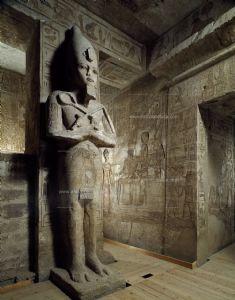
Temple of Ramses II, Abu Simbel
Abu Simbel
Abu Simbel is a temple built Ramses II in ancient Nubia, where he wished to demonstrate his power and his divine nature. Ramses II was the son of the Pharaon Sethi I and was a great one. The temple's facade is dominated by four enormous seated statues of The Pharaon. In the entrance of the sanctuary are the statues of Ptah, Amun-Re, Ramses II, and Ra-Harakhte. Twice a year the sun?s rays reach into the sanctuary to illuminate these statues. The building of Abu Simbel includes the Great Temple and the Small one. The Great Temple is dedicated to Ramses II and it shows a vestibule, the great room and the second room. They are decorated with reliefs, pictures and statues. In the great room there is the Battle of Kadesh with the scenes which show Ramses? greatness in battle. Ramses II was particularly proud of his victory at the battle of Kadesh and depicted this on numerous monuments including this temple. Inside the temple, eight Osiride statues of Ramses II are attached to pillars and support the roof.
The Small Temple was probably completed ahead of the Great Temple and is dedicated to Ramesses' favourite wife, Nefertari. There are many representations of the Ramses II and Nefertari, offer sand religious scene. There is also the Queen consacration, with Nefertari between Hathor and Isis



